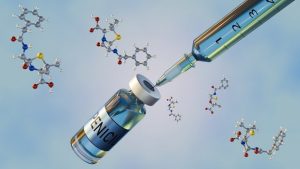ForumIAS announcing GS Foundation Program for UPSC CSE 2025-26 from 19 April. Click Here for more information.
ForumIAS Answer Writing Focus Group (AWFG) for Mains 2024 commencing from 24th June 2024. The Entrance Test for the program will be held on 28th April 2024 at 9 AM. To know more about the program visit: https://forumias.com/blog/awfg2024
Source-This post on Penicillin G manufacturing in India has been created based on the article “India to restart Penicillin G manufacture: why was it stopped, what changed now” published in “The Indian Express” on 7 March 2024.
Why in the news?
India has decided to resume the manufacturing of the common antibiotic Penicillin G after nearly 3 decades.
About Penicillin G

1) It is a medication used to manage and treat a wide range of infections. This is very effective against gram-positive and gram-negative cocci bacterial infections. For Ex- Susceptible bacterial infections in the stomach.
2) It is the active pharmaceutical ingredient (API) used in manufacturing several common antibiotics.
About Active Pharmaceutical Ingredients
Description– These are the active ingredients contained in a medicine. It is that part of the medicine that produces the intended therapeutic effects. For example, in a painkiller, the active ingredient relieves pain.
Quantity– A Small amount of the API is required to produce the effect, and so the medicine contains only the required amount of the API.
Largest production– China is one of the largest producers of Key Starting Material (KSM) and APIs in the world.
Why did penicillin manufacturing stop in India?
1) It was phased out of production because of subsidy-driven cheaper Chinese products flooding the market.
2) The Drug Prices Control Order ensured that more companies went for cheaper imported products. The Drug Prices Control Order regulates the price of essential medicines in India.
What is a Production Linked Incentive (PLI) Scheme?
Objective– To promote the domestic manufacturing of APIs, drug intermediates and key starting materials (KSMs).
Incentive– The scheme envisages support of 20% for first four years, 15% for fifth year, and 5% for sixth year on eligible sales of fermentation-based bulk drugs such as antibiotics, enzymes, and hormones such as insulin.
Implementation– The scheme will be implemented through a Project Management Agency (PMA) to be nominated by the Department of Pharmaceuticals.
NOTE– After PLI scheme, there has been a decline in the imports of APIs.
Read more-Increasing Antimicrobial Resistance in India
UPSC Syllabus-Science & technology.




